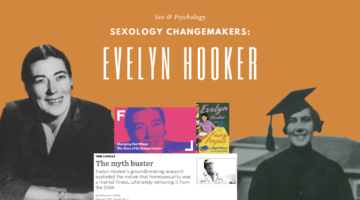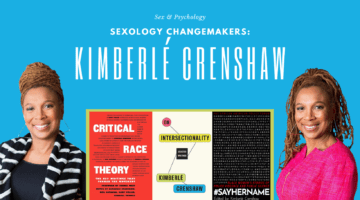Are Neurodivergent People More Likely to be Kinky?
August 30, 2023 by Emily Mendelson
Some individuals who frequent kink and BDSM spaces have observed that they meet more individuals who are neurodivergent than in other social settings. So is there truly a correlation between these things and, if so, why? Scholarly research on the relationship between neurodivergence and practicing kink has recently begun to emerge, offering insight into how these traits are related, how they can complement one another, and what it all means for our understanding of human sexuality. Below, we’ll review some recent findings, as well as explore what neurodivergence means in more detail.
What is neurodivergence?
Neurodiversity encompasses the full range of cognitive functioning in people of all ability levels. Individuals who are neurodivergent have brains that process and understand concepts in ways that are outside what is understood to be “typical” in social settings. These differences may be in ways of learning, perceiving the environment, and operationalizing social cues. Simply put, neurodivergent individuals are people whose brain differences affect how their brains work. Individuals who experience “typical” cognitive processes are subsequently referred to as neurotypical.
Two of the most common manifestations of neurodivergence are autism and ADHD, which are conditions that much of the current research about kink/BDSM focuses on. However, the term neurodivergent also includes conditions such as dyslexia, down syndrome, and bipolar disorder, as examples.
Some academic literature may also reference the term neuroqueer (a portmanteau of neurodivergent and queer), which was coined by Dr. Nick Walker in 2015. She describes this term as both an adjective and a verb such that individuals can be neuroqueer while also participating in the neuroqueering of everyday life.
What is kink/BDSM?
Kink is a very broad concept that encompasses pretty much any form of sexual expression that falls outside of the mainstream. This includes the eroticization of intense sensations (such as mixing pleasure and pain), playing with power differentials, deriving pleasure from inanimate objects, role playing, and more. A popular manifestation of kink is BDSM (Bondage and Discipline, Dominance and Submission, Sadism and Masochism), which refers to a wide range of sexual practices. We have several podcast episodes all about the science of kink and BDSM, which aims to demystify kink if you’re interested in learning more.
Why might neurodivergence and kink be related?
To be clear, there is not a one-to-one correlation between neurodivergence and participation in kink/BDSM. Rather, there appears to be an overrepresentation of neurodivergent individuals in kinky spaces as compared to estimates of these characteristics within the overall population [1,2]. In the case of autistic individuals, it has been hypothesized that there is an association with intense sensory input that is desirable as part of kink practices. For example, BDSM activities may aid in reducing sensory overload in autistic adults through the use of blindfolds and earplugs, or practicing kink in a dark dungeon setting. [3]
Research has also indicated that the explicit and literal language that structures BDSM and kink practices is appealing to some autistic individuals who may seek this form of communication within interpersonal relationships [2,3]. For example, explicit delineations of power dynamics, expectations of sexual (or non-sexual pleasure), and clear and direct consent practices are embedded within kink communities. This approach to sexual activity may be sought out by neurodivergent individuals who find difficulty with neurotypical social cues.
Kink/BDSM spaces may also provide a social community for neurodivergent individuals. A recent study published in The Journal of Sex Research sought to consider how pup play may be attractive for neurodivergent individuals [1]. The results indicate that the participants in this study, who were recruited because of their involvement in the pup play community, had a much higher percentage who are likely autistic as compared to the estimated 1% of the New Zealand population. Interestingly, while there was not a significant relationship between autistic traits and participating in the pup vs. handler role, there was a slight inclination for autistic individuals to prefer one role as opposed to role-switching.
Taken altogether, the associations between neurodivergence and participation in kink/BDSM may be unsurprising given the well-documented relationships between neurodivergence and queerness, and queerness with kink/BDSM. [4] However, further research about this association is likely to provide important insights about human sexuality, such as how we understand pleasure sensations and the most effective forms of sexual communication.
Sources for further reading and learning
External blog post: What is neuroqueer?
Journal article: A preliminary investigation into intersections of sexual communication in bondage, domination, sadomasochism and disability
Sex and Psychology podcast episode: Sex and disability with guest Andrew Gurza
References
1: Wignall, L., Moseley, R., & McCormack, M. (2023). Autistic traits of people who engage in pup play: Occurrence, characteristics and social connections. The Journal of Sex Research, 0(0), 1–11. https://doi.org/10.1080/00224499.2023.2239225
2: Pliskin, A. E. (2022). Autism, sexuality, and BDSM. Ought: The Journal of Autistic Culture, 4(1). https://doi.org/10.9707/2833-1508.1107
3: Pearson, A., & Hodgetts, S. (2023). “Comforting, reassuring, and…hot”: A qualitative exploration of engaging in bondage, discipline, domination, submission, sadism and (sado)masochism and kink from the perspective of autistic adults. Autism in Adulthood. https://doi.org/10.1089/aut.2022.0103
4: Muzacz, A. K. (2021). Expressions of queer intimacy: BDSM and kink as means of self-actualization. Journal of Humanistic Psychology, 00221678211022638. https://doi.org/10.1177/00221678211022638
Do you have a personal experience with neurodivergence and kink? Let us know in the comments below if you’d like to share.
Want to learn more about Sex and Psychology? Click here for more from the blog or here to listen to the podcast.
Image Source: labunsky via Unsplash

Dr. Justin Lehmiller
Founder & Owner of Sex and PsychologyDr. Justin Lehmiller is a social psychologist and Research Fellow at The Kinsey Institute. He runs the Sex and Psychology blog and podcast and is author of the popular book Tell Me What You Want. Dr. Lehmiller is an award-winning educator, and a prolific researcher who has published more than 50 academic works.
Read full bio >


